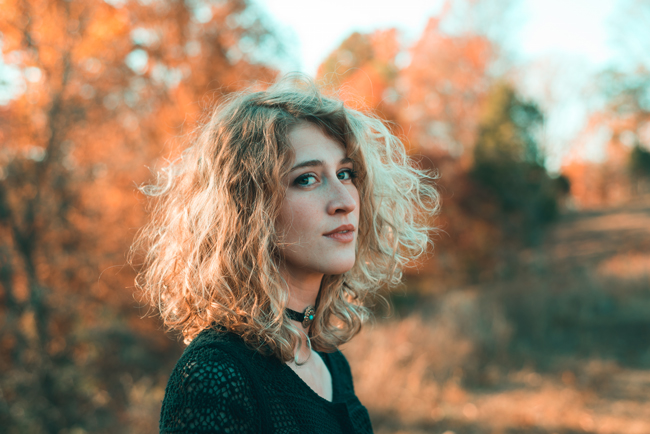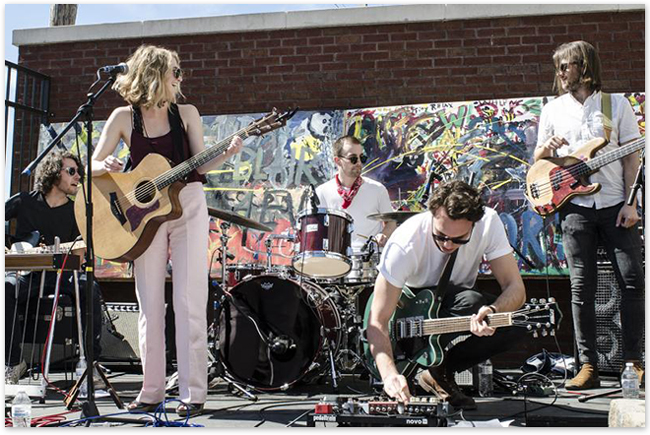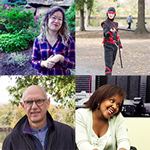Faces Behind the Screen: Zoë
Quick Links
<< Return to all “Faces Behind the Screen” stories
Photo: Alexandra Justice
Losing one’s ability to hear doesn’t also have to mean losing one’s ability to make music.
Just ask Zoë Nutt, an emerging singer/songwriter from Knoxville, TN who’s lived without hearing in her right ear for most of her life.
By the time she was 8 years old, Zoë was completely deaf in her right ear — the result of a gradually worsening hearing condition from the time of her birth. Nonetheless, Zoë was always very passionate about music, singing in choirs and school theater productions all through high school.
Zoë’s drive to do more with her talents led her to study classical music at Belmont University where, eventually, she was accepted into a very competitive songwriting program.
Right around the time she was accepted, though, something happened that threatened to end her musical pursuits altogether.
Would you mind telling your story of hearing loss?
I’ve always been partially deaf in my right ear. And by the time I was eight, I was completely deaf in my right ear. And no one really knows the cause of it. They believe it’s nerve damage from when I was in my mother’s womb, from possibly a virus called CMD, cytomegalovirus. But they can’t say for sure.
And it’s not something where you can get a cochlear implant since it’s nerve damage, or so they believe. So, I grew up part of that time with a hearing aid in my right ear, when it wasn’t completely gone, just a hearing aid that would amplify the sound.
I went through life just with one ear gone. And it wasn’t too hard. It was just hard to distinguish what people are saying if multiple people were talking, or if there was a noisy room.
I went to college at Belmont University for classical music and for classical voice. And then I changed to a degree in songwriting and music business. And right when I came to that major, and you had to audition. And it’s a pretty difficult program to get into, so I was very proud of myself that I’d only written a few songs at the time. And I thought it was this sort of sign because the few songs I’d written, I’d used to get into the program and I thought, this is great. It’s what I’m meant to do.
“I thought it was this sort of sign because the few songs I’d written, I’d used to get into the program and I thought, this is great. It’s what I’m meant to do. And then that same semester, my left ear started going out.”
And then that same semester, my left ear started going out. And what happened there was that I kind of felt a little sick one day, like I had a cold or something. And the next day, my left ear was stuffed up to a point where I couldn’t speak with someone standing right in front of me. I could barely distinguish what they were saying. And it was very scary. I had the tinnitus come in at that point, too. And I didn’t know what to do. It was this very scary moment where I thought I was going to lose all of my hearing because just in a day I had lost so much.
And I went to the doctor. They gave me steroids, and I gained a little of that hearing back. But they don’t know why the left ear decided to fail out of nowhere. They don’t know what it is.
I’ve done a lost of tests. I’ve done genetic testing. I’ve done just all your basic testing, looking at every which way at this ear. And they can’t find anything wrong. So, that’s the weird part. And it’s also the scary part because I don’t know if my cochlear implant will work in the future…
Can you tell us how this episode lead to writing a song about losing your hearing?
I wrote “Like You,” the song, after one of the doctor appointments when it really sunk in. This is going to be staying. It wasn’t going to go away. When I was younger, I didn’t really think about it.
It wasn’t a calculated thing, like I should write a song about this. I just started writing in my notebook, my feelings. And that became the first two verses.
I spoke to my mother about it, and she gave me her thoughts, which was helpful. Writing a song about someone I don’t know, a child I’ve never had… I don’t know what it’s like to have kids, but my mother does, so we talked about that a lot and that helped me finish the song.
“I think the frustrating thing about hearing loss is that it’s one of those things you can’t see.”
Do you know other musicians who have hearing loss?
I actually don’t know anyone with hearing loss. Some of my musician friends would say they’ll hear ringing sometimes or they’ve got a little bit of hearing loss, just from listening to loud noises. But I don’t really have a community of musicians or, frankly, anyone with hearing loss.
I think the frustrating thing about hearing loss is that it’s one of those things you can’t see. People forget about it pretty quickly and easily. It’s hard to find people to connect with. You can’t just look at someone and know they have it.
Even my friends forget that I have hearing loss because it’s just not something they see every day. It’s not something I remind them of constantly because it gets a little bit annoying when you’re asking “what?” every two seconds.
But I’ve started learning about some communities that I’d like to be a part of, because I really don’t know of anyone, personally. I started learning about some of these organizations: Hearing Loss Association of America, and Aid the Silent which has music festivals that cater to hearing loss. That’s just in Nashville.
Have your parents been supportive with your musical pursuits?
They’ve always been supportive of whatever I’ve wanted to do. I have an amazing family. But music was always something important in my life growing up. When I had hearing loss in one ear, they didn’t think anything of it. They said, keep doing music.
Then when I lost even more hearing recently, the way they looked at it was, well, you’ve got a timer on it, and we might as well just push this really hard. You should go to music right now — and it’s been a huge help. They’ve helped me at every turn, whenever I need some encouragement or if I need a push financially or emotionally, whatever it is. They’re always there, and they see the importance of me doing this now while I can.
“They’re always there, and they see the importance of me doing this now while I can.”
A really big reason I have such a love for lyrics is that my father would ask me what songs on the radio meant while we were driving to school. I wasn’t really allowed to get out of the car until I said what the lyrics meant and I had to get it right. He’s not an extremely musical person, he just knew that was important.
Photo: 105.3 WFIV. Taken at Rhythm N’ Blooms Festival (Knoxville, TN).
What would you say is your biggest struggle right now dealing with hearing loss?
Socially, the biggest struggle is hearing people if there’s any sort of background noise or if we’re at a restaurant, at a bar, at a show, or even just at a friend’s house and there’s a lot of people talking or there’s music going on. I usually miss half of the conversation. So that can be frustrating.
I’ve had many times where I’ve laughed at the wrong things because I thought someone was saying one thing and they were saying something very opposite. Or there are times, sometimes it can be funny. I’ll say something that no one said at all, and it adds some humor. But socially, that’s the hardest thing, that people forget you have hearing loss so they don’t really think to repeat things or they get frustrated when they have to repeat things.
For anyone with hearing loss, I’d say just embrace it…
But that’s always been there, and it’s hard to really hear lyrics in songs. So, I love having a lyric book or looking on my phone. Those are the kind of things that I really like.
But musically, when it comes to performing, my biggest struggle is poor monitors. I play shows that have bad monitors sometimes, and that’s the hardest thing. Trying to explain to a sound engineer, hey, this is not working. I can’t hear what’s going on with my band, and I need you to mix it this way or that way.
And sometimes it’s just not going to work out so you just have to trust that your band’s behind you and that they know what you’re going to do and when. That’s probably the hardest thing. Just making sure I can hear everything that the band’s doing and what I’m doing.
Would you have any advice for other musicians or anyone, in general, dealing with hearing loss?
For anyone with hearing loss, I’d say just embrace it… Don’t look at it as a disability or as something that’s going to change how you want to do things.
Accept it and make it a better part of your story.
—
This page was originally published on 5/16/2017 and was updated on 1/17/2018.
These days, you can find Zoë singing, playing solo acoustic, on stage with her band, The Union, or performing alongside big names like Young the Giant and Gogol Bordello at various festivals and venues in the Knoxville and Nashville, TN area.
We want to extend a huge thank you to Zoë Nutt for sharing her story with us, and to Nancy Macklin from the Hearing Loss Association of America (HLAA) for putting us in touch.
You can find Zoë’s music on YouTube, Spotify, and NoiseTrade.com where all proceeds from downloads will go to HLAA.
Faces Behind the Screen is a storytelling project focusing on members of the Deaf and hard of hearing community.






